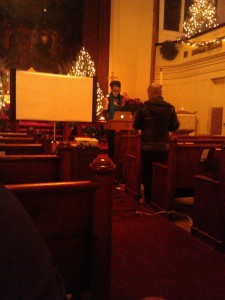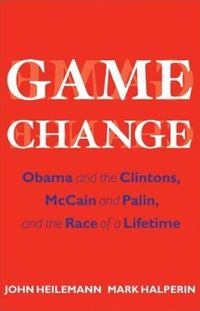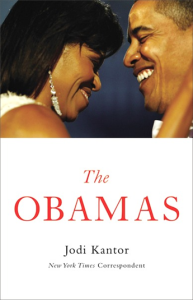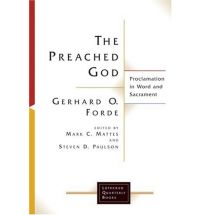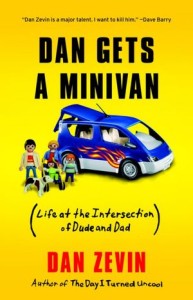So, looks like you can get a doctorate in Ministry to Emerging Generations now.
Jesus commands his followers to “go and make disciples of all nations.” Fulfilling the Great Commission in a rapidly changing, post-Christian world requires the church to think seriously about responding to the unique “nation” and culture of young people living in our midst. We need also to develop effective paradigms for understanding and reaching cultures of future emerging generations. In fact, the label “Emerging generations” is no longer limited to just teenagers. In addition, “adolescence” is no longer limited to those whose chronological age places them in their middle and high school years. Our growing understanding of early, middle, and extended adolescence has expanded the boundaries on both ends, resulting in a world where youth culture is shaping individuals in the emerging generations from birth through young adulthood.
This track will help those ministering to the emerging generations – youth pastors, children’s ministers, college/young adult ministers, and pastors – to work through the practical implications of living obediently to the Great Commission of Jesus Christ in today’s rapidly changing cultural context (including the changes yet to come). Members of the cohort will be equipped to embrace the task of “dual listening” as defined by John Stott: “We stand between the Word and the world with consequent obligation to listen to both. We listen to the Word to discover even more of the riches of Christ. We listen to the world in order to discern which of Christ’s riches are needed most and how to present them in their best light.” (The Contemporary Christian)
What the what?
I mean, I get it. I get why a seminary would create this program. It seems relevant. I’m sure there are a lot of pastors out there who want the kids to get off their lawns; I’ve met a few of them. And there’s been plenty of pop-theology/pop-psychology/pop-whatever books written on the subject – enough so that critical mass has been reached and stuff like this is going to explode all over the place. They’ll read a few books by Rob Bell, visit an “emerging” church that’s not self-sufficient but seems “hip”, write a paper, start a Twitter account, pat themselves on the back, and call it a day. They’ll get a degree to hang on the wall and some more college debt hanging around their necks, the seminary will get some extra tuition, and everyone wins.
Well, actually, nobody does.
There’s just so much silly inherent in this, I don’t know where to start. First off, this is just a screams out-of-touch-old-person talking to kids, in a program that won’t work. Secondly, post-Christian/changing cultural contexts sets off red flags for me. It assumes that there was some cultural context that was “Christian” and that we are, today, moving beyond that. It’s a silly reading of history because it ignores, well, basic reality, that cultural contexts of the past have been romanticized in this country and that those of us who do not fit those cultural contexts are, somehow, just brand new (like my brown skin is some kind of unexplained, and new, birth defect). It also ignores basic facts like, how, the percentage of foreign-born people in the US is finally returning to historical averages – and that the last fifty years, with it’s super low number, was the exception, not the norm. It also makes the assumption that the celebrated “nones” of today are any different from the thousands of years of C-and-E Christians that the church has experienced. The difference is that they don’t mind calling themselves “nones” now – a willingness that is important to acknowledge but doesn’t change the fact that the church has been dealing with this stuff since forever. And the simple fact is that none of this stuff came out of a vacuum. The “reality” of today comes from somewhere. If you want to blame someone, blame thirty years ago. The seeds of our reality was already there – even if you try to romanticize it away.
And this will not actually make a difference to anyone in the “emerging” generation. I’m willing to speak for all of us, right now. I’m willing to make generalizations, right now. I’m willing to stand up on the mic and say, with a loud voice, that this nonsense won’t work. And it won’t work because it says a lot of nothing. By labeling the “emerging generations” as “the nations,” you’ve already defined them as the outsiders. By poorly mixing discipleship with the Word, and ignoring the BAPTIZING part of the Great Commission, you’ve automatically assumed that these emerging generations do not belong with the “true path.” They are on the outside and this program is designed to, somehow, bring them inside, and make them part of the righteous. It masks faith with culture under the pretex of being open and new. This is silliness. We’ve just gone through Christmas, worked our way through Epiphany, and we’re about to see Jesus turn water into wine. If anyone has been paying attention to the lectionary, they’ll notice that there isn’t a lot of “bringing into the fold” that is being done in these stories. Rather, God seems to be breaking into the social contexts that we’ve created. And this is important – because if all social contexts are open to be broken, then all are objectively on the same level. Faith ends up being open to everyone, even those in the “emerging generations.” And I don’t see the Magi, or the shepherds, or the party goers being told to change their cultural or generation status at the door.

 For the last two months, or so, our bedtime routine for Oliver includes the reading of, at least, two books. If the books don’t do it, we’ll sing a couple of hymns. If the hymns don’t cut it, we’ll bust out another book. And if that last book doesn’t work, I toss him in the air for a bit. And if that doesn’t work, I tell him about my day. That usually does it.
For the last two months, or so, our bedtime routine for Oliver includes the reading of, at least, two books. If the books don’t do it, we’ll sing a couple of hymns. If the hymns don’t cut it, we’ll bust out another book. And if that last book doesn’t work, I toss him in the air for a bit. And if that doesn’t work, I tell him about my day. That usually does it. 
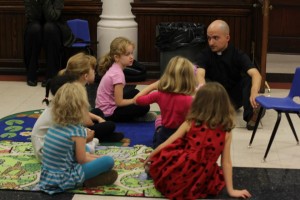 There’s a joke in my clergy circle that people think all we do is sit around and pray all day. Of course, we don’t. We’re busy. We do things. We plan, write sermons, go to committee meetings, do, uh, things – we’re busy people. Oh. And we do pray…. occasionally.
There’s a joke in my clergy circle that people think all we do is sit around and pray all day. Of course, we don’t. We’re busy. We do things. We plan, write sermons, go to committee meetings, do, uh, things – we’re busy people. Oh. And we do pray…. occasionally.
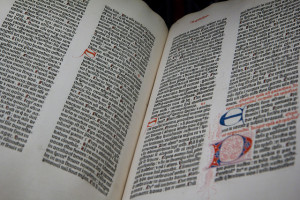 INAUGURAMA – Obama to be sworn in on MLK and Lincoln Bibles: The Presidential Inaugural Committee will announce today that on Mon., Jan. 21 — the 150th anniversary of the Emancipation Proclamation, and 50 years after the birth of the Civil Rights movement — President Obama will be sworn in using a Bible that belonged to Dr. Martin Luther King Jr. and the Lincoln Bible, which Obama used in 2009. At his official swearing-in on Sunday, the President will use the Robinson Family Bible, which belonged to the First Lady’s grandmother. On both days, Vice President Biden will use the Biden Family Bible, which he used each time he was sworn in as a U.S. Senator, and in 2009.
INAUGURAMA – Obama to be sworn in on MLK and Lincoln Bibles: The Presidential Inaugural Committee will announce today that on Mon., Jan. 21 — the 150th anniversary of the Emancipation Proclamation, and 50 years after the birth of the Civil Rights movement — President Obama will be sworn in using a Bible that belonged to Dr. Martin Luther King Jr. and the Lincoln Bible, which Obama used in 2009. At his official swearing-in on Sunday, the President will use the Robinson Family Bible, which belonged to the First Lady’s grandmother. On both days, Vice President Biden will use the Biden Family Bible, which he used each time he was sworn in as a U.S. Senator, and in 2009.
 So, today, I was told that I didn’t speak like I’m from around here.
So, today, I was told that I didn’t speak like I’m from around here.